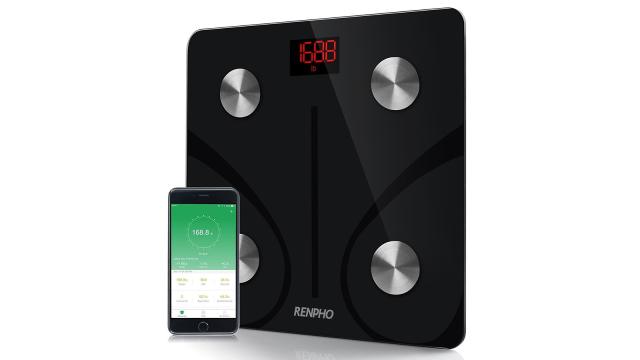As Bluetooth has become ubiquitous, it’s been added to more and more devices. Coupled with frameworks such as Apple’s HealthKit and Fitbit’s family of APIs, hardware makers in the health and well-bing business can now take what used to be a disconnected device and easily hook it up to a smartphone app that can use the data in interesting ways. Smart scales, like the Renpho Digital Scales are one such device. But, unlike most of the other similar devices on the market, they do this at about a quarter of the price of their competitors.
The Renpho Digital Scales took just a few minutes to set up. Powered by three AAA batteries, which are supplied, the most time consuming part of the set-up process was downloading the smartphone app. There are both iOS and Android versions. The iOS version requires iOS 8.0 or later with the Android version requiting version 6 (Marshmallow) or later. The iOS version has been updated to fill the entire iPhone X display.
Once the Renpho is powered up and the app is installed, you simply stand on the scales to power them on and add the device to the app through the Device Management settings. That process took just a few moments.
You’ll also need to create an account with Renpho in order to use the device. This is something I really don’t get. I have no desire to share my health data with the company. And while I did connect the Renpho app with Apple’s HealthKit, that data is only stored on my iPhone and not shared (as far as I can tell). For example, I can’t access HealthKit data from my other Apple devices or iCloud.
If you’re a Fitbit user, and don’t want to spring for the expensive Fitbit Aria scales, you can send your weight to the Fitbit app as Renpho integrates with it.
I also provided the app with my age, gender and height.
After going through the installation, I stood on the scales (you’ll need to do that in bare feet) and the device carried out two measurements. One is the usual weight measure. The other uses a weak electrical impulse. The resistance in that impulse that is sent between sensors on the scale is used to calculate the composition of your body.
This is not a perfect measure. It relies on algorithms that make assumptions about your body based on age, gender and height. So, I’d treat the body fat measurement by looking at trends rather than accepting it as a truly absolute measurement.
That said, Renpho says the scales are FDA approved which means the scales are fit for their intended use.
I compared the results from the Renpho scales with those of the Fitbit Aria scales I have here.
As far as weight goes, the two scales were almost exactly the same – the Fitbit Aria measures to one decimal place while the Renpho goes to two places. For body fat, the Fitbit offered better news, saying I had 2% less fat than the Renpho scales. However, I only track body fat as a trend and would only rely on a more thorough scan such as a DEXA (Dual energy x-ray absorptiometry) which is generally accepted as a much more accurate way of messing body composition.
In addition to weight and body fat, the Renpho app delivers a number of other metrics. These are
- BMI
- Fat free body weight
- Body water
- Skeletal muscle
- Muscle mass
- Bone mas
- Protein
- Basal metabolic rate
- Metabolic age
It’s important to remember that these are all calculated either via an algorithm or by straight arithmetic. And BMI is a terrible tool for tracking your health. It was only ever intended as a tool for population studies and not for individuals. It has been badly misused by the health industry and should be disregarded as a tool for measuring your health.
At just $39.95 from Amazon, the Renpho Smart Scales do everything their more expensive counterparts do at a fraction of the cost. I ordered a set through Amazon and they were delivered three business days later.
